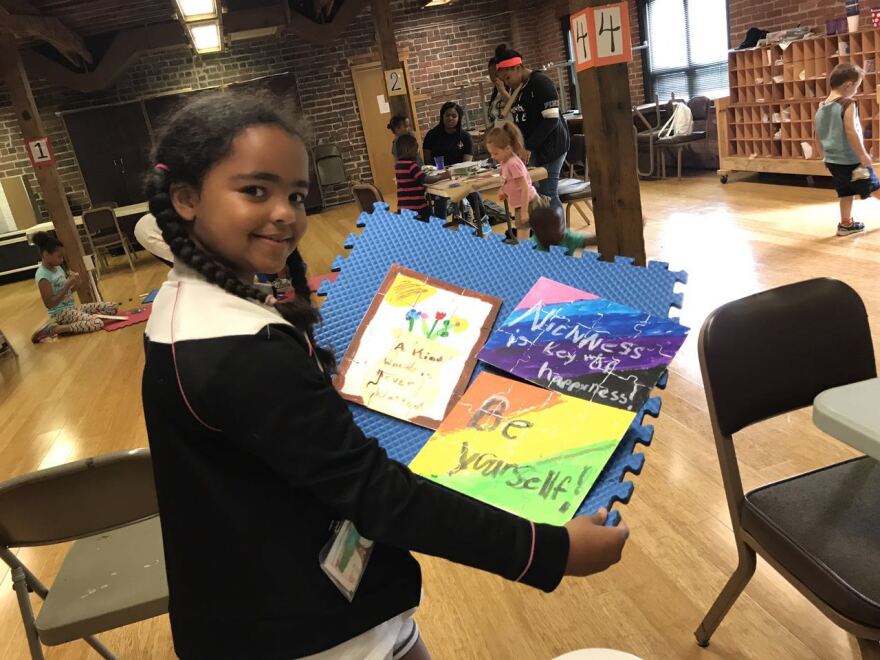
Every summer the Springfield Regional Arts Council cooperates with the Springfield Community Center to present a six-week program for kids in Zones 1 and 2 who are served by the Community Center. It's called "Arts in the Park"--Jordan Valley Park, to be exact, where the Arts Council's Creamery Arts Center offices are located. Each week during the six-week program, representatives from Springfield's major visual and performing arts groups conduct week-long workshops with the kids based on each organization's specialty: the Symphony, Little Theatre, the Opera, the Art Museum, and so on.
Last summer Arts in the Park added two additional weeks to its curriculum: teaching kids in 4th through 9th grades the "Ten Tenets" of Springfield's "Be Civil, Be Heard" project. The Arts Council's recently-retired Director of Programs and Exhibitions, Stephanie Cramer, was part of the meetings back in 2011 that formed the foundation of Be Civil Be Heard.
Right before the 2017 Arts in the Park began for the summer, Cramer received an urgent phone call from Springfield Community Center Director Calvin Allen. According to Cramer, Allen called her and said, "Stephanie, I've got problems! Kids are actually coming from the junior high, they're fighting across the street. And parents are even joining them! Stephanie, I need a program for the older kids," as they were the ones fighting.
Cramer felt that Calvin Allen's call for help dovetailed perfectly with the Be Civil, Be Heard message, and sought to enlist the help of Be Civil, Be Heard curator Dr. Elizabeth Dusash Buskirk, says the Arts Council's grant writer Avery Parrish. "It was two different weeks, but we split it up into three days over (each of) the two weeks. So we had a first initial kind of training, and had the kids learn the program. And we had a kind of 'incentivizing' week to keep them continuing their good behavior and good civility traits to the end of the program, where we had a graduation." Stephanie Cramer marvels at "how it all just came together in, like, one week! And then here Keisha comes into my office. I'm like, 'Oh! Well, you're exactly who I've been looking for!' Keisha's about to graduate."
She was referring to Keisha McMillen, an undergrad at Drury University earning her Bachelor's degree in Theater and Arts Administration. She served as the Arts Council's Daily Program Coordinating Intern during this year's Arts in the Park. "Being the camp coordinator," says McMillen, "I had the privilege to really get to know the kids on a more personal level. They really started to open up to me and talk to me about anything they wanted to. They felt safe in the environment to do so."
The camp leaders did work Be Civil, Be Heard into the curriculum for the younger kids too, but at a more basic level, says Stephanie Cramer. Rather than dealing with the "10 Tenets of Civility," the younger kids--third grade and under--were introduced to concepts such as "no pushing, no touching, be aware of your space, be considerate, acknowledge others."
One of the main buzzwords that kept coming up among the pre-teens and teenagers was "drama," says Cramer. "For example, if somebody says something to you that is inappropriate, what do you do? Some of (the kids) said, 'You walk away. You don't increase the "drama."' And "drama" was a word they kept using, because that's how pre-teens fight, with dramatic language--and, hopefully, not actions."
Several of the kids gave a presentation about "drama" and how to de-fuse it. After telling their fellow students they would be talking to them about "drama," the group went on to define "drama" as "something that happens to multiple people which causes a lot of fights and arguing." "What causes drama? Rumors... arguing... bullying... gossip... and snitching."
The women from the Arts Council told me there was plenty of "drama," at least at first. The kids were more than a little dubious--and cynical--about the Be Civil, Be Heard message, says Avery Parrish. "The old kids, when they first got there, we would start talking about Be Civil, Be Heard, and they would be like--" (she makes a sort of annoyed groaning noise). "They'd roll their eyes... they did not want to participate!" says Keisha McMillen. Adds Parrish, "They did that, and they were like, 'can we just do art?!'" But Daily Program Intern Keisha McMillen saw remarkable changes in attitude in some of the kids over the course of the camp.
"Comparing the first week to the last week, I would have the students be like, 'Well, I don't care about this! I have to look out for myself--I don't care about anyone else,' etc.etc. And then, towards the end of the program I had the privilege to talk to the students one-on-one and ask them 'What have you learned throughout this process? what does civility mean to you?' And a lot of them were able to tell me, 'I can see that there are actually people who care about me. There are people who want me to succeed. There are people who want to help me. And I want to do the same for others, what you guys here at the program have done for me.'"
I asked the women to comment on the state of civility in Springfield today, and what challenges lie ahead. Says the Arts Council's grant writer Avery Parrish, "What really upsets me is that I wish people would jump to trying to understand rather than jump to be defensive and harm one another." Director of Programs and Exhibitions Stephanie Cramer had a perhaps more positive take. "You know, I think we have a chance. We just have to be able to let other people express themselves, and try to understand their point of view. And hopefully, we can all be a little less angry and maybe a little more open."




